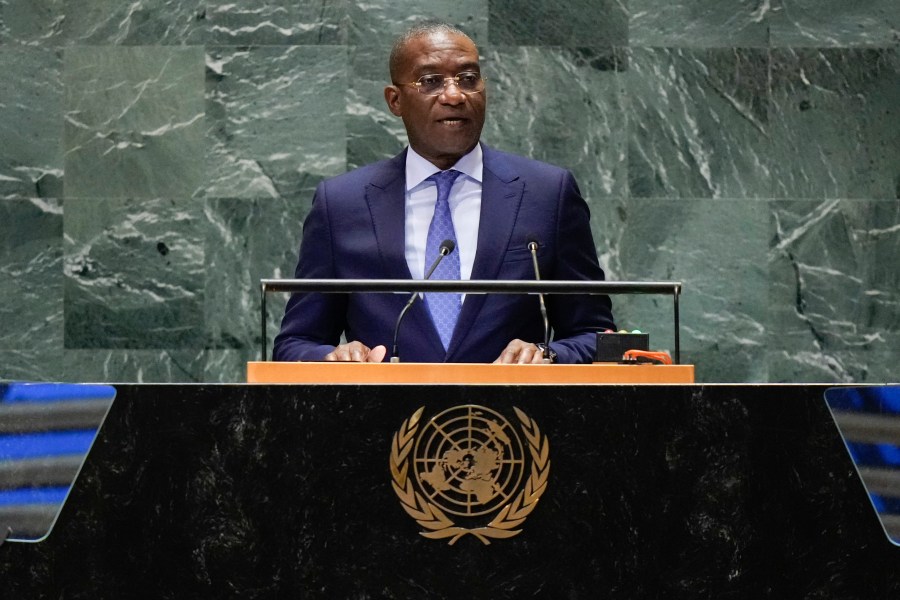UNITED NATIONS (AP) — The U.N. General Assembly adopted a “Pact for the Future” to meet the challenges of the 21st century. Now comes the hard part: uniting the world’s divided nations to move quickly to implement the agreement’s 56 actions.
As Czech President Petr Pavel put it Monday at the summit meeting surrounding the pact: “Our work begins at home.”
The 193-member world body approved the pact Sunday. The document is meant to link nations in tackling challenges ranging from climate change and artificial intelligence to escalating conflicts and increasing inequality and poverty — and improve the lives of the world’s more than 8 billion people.
The 42-page pact was adopted at Sunday’s opening of a two-day “Summit of the Future,” which continued Monday as leaders of many countries gave their views on the challenges facing the world.
And with those remarks, the leaders previewed some themes to expect at the assembly’s big annual meeting, which gets into full gear Tuesday.
Indian Prime Minister Narendra Modi called for technology regulation that’s global but “ensures that national sovereignty and integrity are upheld.” Chinese Foreign Minister Wang Yi reiterated his country’s frequent complaints about nations dividing into geopolitical blocs, and about countries singlehandedly imposing sanctions.
Leaders from countries ranging from Angola to Ecuador to Slovakia mentioned a roster of other challenges: inequality, youth unemployment, the spread of disinformation, and more.
Russia tried to change the pact
Right up to Sunday’s vote, it was unclear whether the pact would be adopted. In fact, there was so much suspense that U.N. Secretary-General António Guterres had three prepared speeches, one for approval, one for rejection, and one if things weren’t clear, U.N. spokesman Stephane Dujarric said.
Russia’s Deputy Foreign Minster Sergey Vershinin proposed an amendment that would have significantly watered down the agreement. “No one is happy with this pact,” he said.
It turned out he was wrong. Some 143 countries, including Africa’s 54 nations, voted not to take action on Russia’s amendment. Only six countries supported Russia — Iran, Belarus, North Korea, Nicaragua, Sudan and Syria. Fifteen countries abstained.
Assembly President Philémon Yang then put the pact to a vote and banged his gavel, signifying the consensus of all U.N. member nations that was required for approval — to vigorous applause.
Russia has made significant inroads in Africa, in countries such as Mali, Burkina Faso, Niger and Central African Republic. The rejection of Russia’s amendments by African countries and Mexico, a major Latin American power, was seen as a blow to Moscow by some diplomats and observers.
Vershinin complained at the summit Monday that the pact contains some “unacceptable elements.” His country wants “to disassociate ourselves from the consensus” on it, he said.
He spoke about an hour before Ukrainian President Volodymyr Zelenskyy, who referred to Russia and supporters of its proposed amendment as “accomplices” in opposing efforts to make the U.N. more effective.
The secretary-general issues a challenge
Guterres, clearly relieved by the pact’s approval, then issued a challenge to the leaders: Implement the pact. Prioritize dialogue and negotiations. End “wars tearing our world apart” from the Middle East to Ukraine and Sudan. Reform the powerful U.N. Security Council. Accelerate changes to the international financial system. Ramp up a transition from fossil fuels. Listen to young people and include them in decision-making.
For all the endorsements of the agreement, some speakers noted shortcomings.
The Marshall Islands’ president, Hilda Heine, said it’s “hard not to be frustrated over apparent political limitations” in the pact.
“There is an incredible and persistent gap between ambitious solutions and international finance at hand,” she said.
Speaking for the U.N.’s main bloc of developing countries — the Group of 77, which now has 134 members, including China — Ugandan Prime Minister Robinah Nabbanja regretted that the pact doesn’t recognize actions that developed countries should take to close the widening gaps between them and developing countries.
In a rare move at a high-level U.N. meeting where leaders often exceed the announced time limit, speeches were muted after five minutes.
There’s a long list of things to tackle
The Pact for the Future says world leaders are gathering “at a time of profound global transformation,” and it warns of “rising catastrophic and existential risks” that could tip people everywhere “into a future of persistent crisis and breakdown.”
Guterres singled out a number of key provisions in the pact and its accompanying annexes, a Global Digital Compact and Declaration on Future Generations.
The pact commits world leaders to reform the 15-member Security Council, to make it more reflective of today’s world and “redress the historical injustice against Africa,” which has no permanent seat, and to address the under-representation of the Asia-Pacific region and Latin America.
It also “represents the first agreed multilateral support for nuclear disarmament in more than a decade,” Guterres said, and it commits “to steps to prevent an arms race in outer space and to govern the use of lethal autonomous weapons.”
The Global Digital Compact “includes the first truly universal agreement on the international governance of artificial intelligence,” the U.N. chief said.
As for human rights, Guterres said, “in the face of a surge in misogyny and a rollback of women’s reproductive rights,” the document commits governments to removing legal, social and economic barriers facing women and girls.
___
Edith M. Lederer, chief U.N. correspondent for The Associated Press, has covered foreign affairs for more than a half-century. See more of AP’s coverage of the U.N. General Assembly at https://apnews.com/hub/united-nations

